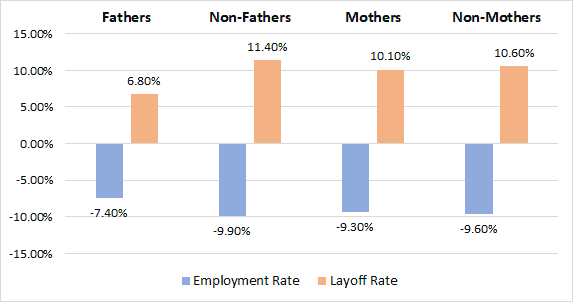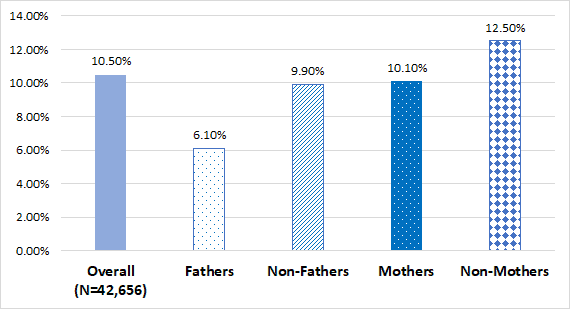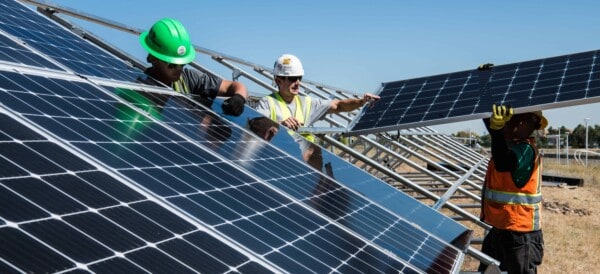A recent study by Dias and colleagues (2020) exposes the employment inequality along the lines of gender and parenthood during the COVID-19 pandemic.
Researchers examined the effects of COVID-19 on layoffs and employment rates using Current Population Survey (CPS) data. Overall, fathers’ employment seemed to be the least affected by COVID-19, such that their employment rate decreased the least (7.4%) from March to April 2020 while their layoff rate increased the least (6.8%) during the same time period (Figure 1). On the other hand, employees without children of either gender appeared to have the largest changes in employment and layoffs. For instance, the employment rate for women workers without children decreased by 9.6% from March to April 2020, and their layoff rate increased by 10.6% during the same time frame.

The researchers then looked at the degree to which the decrease in employment rates was due to involuntary job losses and layoffs to determine if there were observed differences across parental status and gender. Regression analyses were conducted with a sample of CPS respondents who had been consecutively surveyed from February to April 2020. These analyses revealed the likelihood of being laid off during April and May 2020 differed by gender and parenthood. Specifically, fathers were significantly less likely to be laid off compared to women of either parental status, controlling for age, education, and race. While the probability of being laid off increased by 6.1% for fathers, the likelihood of being laid off increased by 10.1% and 12.5% for mothers and non-mothers, respectively (see Figure 2).
Researchers noted that employers were the ones determining changes in employment status before and immediately after COVID-19, as quit rates among employees were very low during this time.

Supplementary analyses performed by Dias and researchers (2020) found that these employment and layoff rates were most pronounced among college-educated workers and those who at most had attained a high school diploma. For example, while the likelihood of being laid off for college-educated fathers increased slightly (about 4% between March and April 2020), the increase in layoff rates for college-educated non-fathers and college-educated mothers and non-mothers were almost double (8.1%, 7.3, and 7.3%, respectively).
While others may point out that perhaps these unemployment disparities may be a result of gender segregation in occupations, such that male-dominated fields like engineering and technology were least impacted by COVID-19, Dias and colleagues (2020) also include analyses that refute this argument. That is, employment changes and layoffs due to COVID-19 did not disproportionately affect either male-dominated or female-dominated occupations.
This emerging research suggests that perhaps other explanations are at play, including employer discrimination and larger societal beliefs, placing fathers as breadwinners and mothers as caretakers. As employers make decisions about which personnel must be let go as a result of the economic impact of COVID-19, they may rely on these traditional cultural beliefs about who needs to maintain a job to support a family. These decisions, in turn, result in layoff disparities along the lines of gender and parenthood, such that fathers are rewarded with maintaining their job (i.e., fatherhood premium) while non-parents and mothers are the most vulnerable to losing their jobs.
Related Content:
- Infographic: Latest Research on Community College Student Success in Engineering
- Does Remote Work Bring About Gender Equality?
- SWE Research Partner to Offer Free COVID-19 Legal Helpline for Workers
Author
-

Ursula Nguyen is a doctoral candidate in STEM Education at The University of Texas at Austin. She has a BS in Biomedical Engineering from UT-Austin. Prior to returning to UT, she was a first-grade Bilingual math and science teacher in Houston, TX. There, she was also the first-grade Math lead at her school. Her research interest on issues of equity in STEM education at the intersection of race/ethnicity and gender stems from her experiences as both an educator of STEM subjects and as a past engineering student. Currently, she is a graduate research assistant for Dr. Riegle-Crumb and a graduate research intern at SWE.






